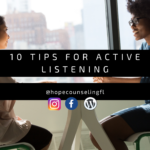In our fast-paced, distraction-filled world, truly listening to someone has become a rare gift. Whether you’re connecting with a partner, friend, or family member, active listening helps build trust, deepen relationships, and prevent misunderstandings. This blog offers 10 practical tips to help you become a better listener—one intentional conversation at a time.
1. Make eye contact: Most of our communication is non-verbal. Many times we engage in conversation with our loved ones but our eyes are fixed on electronic devices. Start listening simply by starting to make eye contact.
2. Ask for clarification: Sometimes we may not understand what the other person is saying immediately. Pause the conversation and ask the person to repeat what they said.
3. Reflect: Reflection is simply asking the person if what you are understanding is correct. For example, you may say “What I hear you say is________” or “Let me see if I am understanding you correctly, I think you said_________”.
4. Provide feedback (when welcomed): At times the speaker just wants to vent, listen as they speak. Sometimes a speaker may be welcoming towards feedback. Provide feedback by asking questions relevant to the conversation, provide new insights or connections but refrain from advice if not asked.
5. Avoid judgment: A speaker will feel heard if you listen to their entire train of thought before providing your opinion about them or the situation. Listen first, analyze, then reply if need be. Refrain from interrupting.
6. Avoid mind reading: When we are in long-term relationships, it is easy to fall under the assumption that we can finish our partner’s sentences. There are always exceptions to the rule. Don’t anticipate what your partner will say. Make room for your partner to say something you did not expect. Acknowledge, validate, then speak.
7. Give a relevant response: Speakers can tell if you are giving a “canned response” (e.i. “mmmmmh”, “ok” “oh, wow”) versus a genuine response that is connected to the conversation. Be honest.
8. Share a story about yourself only if appropriate: If you are anything like me, you like to find relevance to what someone is saying by connecting it to a personal story. While there is nothing essentially wrong with this, many times a speaker may not feel like they are truly listened to if you interject a conversation with a personal story. Only share a personal story that connects with the individual’s conversation if they person feels misunderstood or alone in their struggle.
9. Avoid planning your response: Have you ever had the answer to someone before they are done speaking? I have! However, this practice ties to listening to respond rather than to understand, which in its nature is not active listening. Allow for the person to finish in order for you to fully understand, then formulate your response. Your response may vary depending on additional pieces of information provided.
10. Pause: If you struggle with listening, learn to pause before you will speak in order for you to fully process the information received and then provide a relevant response.
I hope these tips were helpful! If you continue to struggle with being an active listener or lack communication skills, we can help you at Hope Behavioral Health.
Follow us on instagram @hopecounselingfl or Facebook Facebook.com/hopecounselingfl

